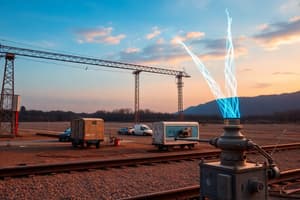Podcast
Questions and Answers
What is the SI unit of work?
What is the SI unit of work?
- Kilowatt (kW)
- Newton (N)
- Watt (W)
- Joule (J) (correct)
How does the kinetic energy of an object change if its velocity is doubled?
How does the kinetic energy of an object change if its velocity is doubled?
- It doubles
- It remains the same
- It decreases by half
- It increases by a factor of four (correct)
What is the formula to calculate potential energy?
What is the formula to calculate potential energy?
- EP = 1/2 mv^2
- EP = Fd
- EP = mv^2
- EP = mgh (correct)
What type of energy is associated with the vibration of particles?
What type of energy is associated with the vibration of particles?
If a body has a mass of 75 kg and is raised from a height of 1.5 m to 2.4 m, what is the gain in potential energy?
If a body has a mass of 75 kg and is raised from a height of 1.5 m to 2.4 m, what is the gain in potential energy?
Which of the following is an example of chemical energy?
Which of the following is an example of chemical energy?
What does the efficiency of a machine indicate?
What does the efficiency of a machine indicate?
What is the SI unit of power?
What is the SI unit of power?
What happens to the kinetic energy of an object if its speed is doubled?
What happens to the kinetic energy of an object if its speed is doubled?
Which statement best defines work in terms of force and displacement?
Which statement best defines work in terms of force and displacement?
What is the relationship between kinetic energy and an object's mass and velocity?
What is the relationship between kinetic energy and an object's mass and velocity?
How do thermal energy and chemical energy differ?
How do thermal energy and chemical energy differ?
What is the significance of keeping all values in standard units when applying conservation of energy?
What is the significance of keeping all values in standard units when applying conservation of energy?
What does it mean that energy can neither be created nor destroyed?
What does it mean that energy can neither be created nor destroyed?
What is the S.I unit of both work and energy?
What is the S.I unit of both work and energy?
Which statement best describes sound energy?
Which statement best describes sound energy?
What is defined as the efficiency of a machine?
What is defined as the efficiency of a machine?
Flashcards are hidden until you start studying
Study Notes
Work and Energy Units
- SI Unit of Work: Joule (J) is the standard unit of work.
- Definition of Joule: 1 Joule is the amount of work done when a force of 1 Newton is applied over a distance of 1 meter.
- SI Unit of Energy: Energy is also measured in Joules (J).
Kinetic and Potential Energy
- Kinetic Energy (KE): Energy an object possesses due to its motion; increases with both mass and the square of velocity.
- Formula: Kinetic energy is calculated using KE = 1/2 mv².
- Effect of Velocity Change: Doubling an object's velocity increases its kinetic energy by a factor of four.
- Potential Energy (PE): Energy stored due to an object's position or condition; calculated using PE = mgh.
Energy Types and Transformations
- Thermal Energy: The total kinetic energy of internal particles in a substance, indicating temperature.
- Sound Energy: Produced by the vibration of particles in a medium.
- Chemical Energy: Energy stored in the bonds of chemical compounds, such as food before digestion.
- Energy Transformation: Energy can change from one form to another, but cannot be created or destroyed in a closed system.
Power and Efficiency
- SI Unit of Power: Watt (W), which indicates the rate at which work is done.
- Power Equation: Power is the work done divided by time (P = W/t).
- Machine Efficiency: Measures how effectively a machine converts energy into useful work, indicating minimal energy waste.
Collisions and Energy Conservation
- Energy Conservation in Collisions: In collisions, momentum is conserved, but energy may be transformed into heat and sound, representing energy loss.
- Importance of Standard Units: Using standard units allows for consistent calculations and accurate results in energy conservation scenarios.
Key Distinctions
- Difference Between Kinetic and Potential Energy: Kinetic energy is related to motion, while potential energy reflects stored energy based on position.
- Work Definition: Work is defined as the product of force and displacement in the direction of the force.
Studying That Suits You
Use AI to generate personalized quizzes and flashcards to suit your learning preferences.




